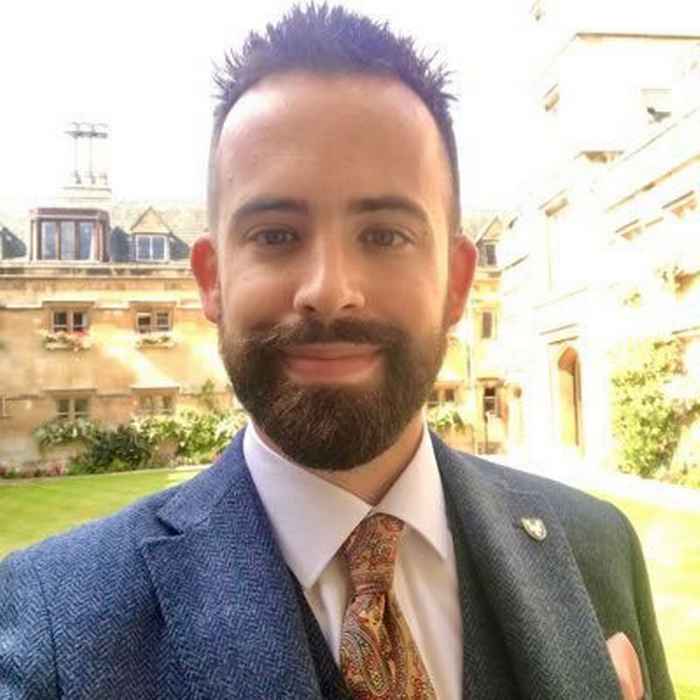Vossius Research Fellow Vincent Roy-Di Piazza
5 September 2023

About the project
Although a considerable amount of scholarship has been devoted to Swedenborg’s reception, less has been written about Swedenborg himself in his own time, and even less has sought to situate him within mainstream Enlightenment scholarship. My fellowship project will provide the first extensive and long-overdue historiographical study of Swedenborg and the Enlightenment since Garrett in 1984. Since then, Enlightenment scholarship has been gradually reappraising the role and epistemic value of figures long considered to be on the margins of the canon of elite philosophers. The long-lasting notion of a homogeneous secular Enlightenment itself has been challenged since the 1960s through a number of dialectic or pluralistic models positing the existence of alternative religious or non-secular Enlightenments (Trevor Roper, Gay, Berlin, Garrett, Porter, Jacobs, Pocock, Young, McMahon, Sorkin, Hanegraaff, Lehner) building consensus for the idea that religious and Enlightenment values were not mutually exclusive, or further, arguing that religious commitments underpinned much early Enlightenment discourse.
This has resulted in more attention being paid to retrospectively-marginalized voices and groups, of which Emanuel Swedenborg stands as a remarkable and yet problematic case. This has been partly due to his controversial fame and a long historiographical isolation, informed both by his Kantian dismissal within the history of philosophy, and enduring devotional narratives from his religious followers. Despite the long-lasting existence of an alternative, non-confessional school of thought on him in his native Sweden, this latter scholarship has largely failed to engage with broader Enlightenment literature, and to further capture the attention of readers beyond specialist circles. More crucially, Swedish scholars have not managed to counter narratives which dismiss Swedenborg as a one-off case, supposedly too singular to be representative of the true nature of an idealized (and largely secular) Kantian Aufklärung.
Moving beyond these two schools, historians of Western Esotericism have long produced studies of non-secular Enlightenments at the margins, described either as ‘covert’, ‘occult’, ‘mystical’, ‘theosophical’, ‘hermetic’ or ‘esoteric’ Enlightenments (Godwin, Garrett, Faivre, Gabay, Hanegraaff, Goodrick-Clarke, Keith Schuchard). In a drastic reversal of his long-standing historiographical isolation, Swedenborg became a central figure within the alternative narratives set by such studies (cf Goodrick-Clarke). Yet, such a reversal came at the cost of a major inflation of Swedenborg’s alleged links to Cambridge neo-platonism, kabbalistic ideas, hermeticism, and Christian theosophy. This highlights how the categorization of Swedenborg as a ‘counter-cultural’, ‘esoteric’ figure is not without raising historical concerns: it too often reduces him to the most heterodox elements of his thought and conflates his positioning with those of figures influenced by his ideas. This more broadly questions to what extent historical models positing the existence of alternative ‘esoteric’ Enlightenment(s) can meaningfully do so before the 1770s, and whether overlooked synergies might emerge from the combined theoretical insights of Western Esotericism scholars and religious Enlightenment scholarship (Sorkin, Lehner, Robertson etc.).
Such difficulties in classifying Swedenborg more broadly highlight unresolved tensions between his self-fashioning during his lifetime, his reputation within orthodox and radical religious milieus, and the historiographical categories (e.g. the debated label of ‘theosopher’) of modern day historians to describe him. My fellowship will support fresh research aiming to resolve such tensions, by exploring how the ‘old problem’ of Swedenborg can pave the way towards a more inclusive historiography, better able to finally integrate long-minored, heterodox religious figures.
About the researcher
I am an early modern historian of science and religion, political economy and the Northern World. I recently completed my PhD at the University of Oxford, and I am currently a postdoctoral fellow at Oxford and Stockholm. Beyond academia, I am also a classically-trained musician and enthusiastic Magic the Gathering player. This website is my official online page as an academic and centralizes information about my research, publications, background and teaching, along with links to my articles and professional social media accounts.